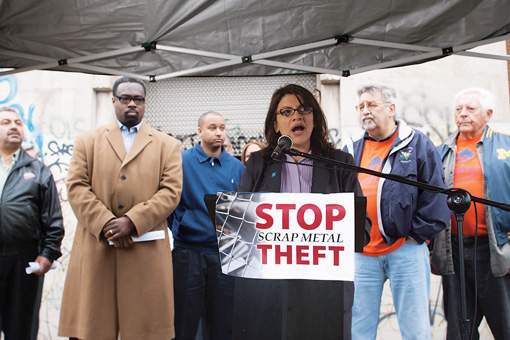Rashida Tlaib is used to overcoming obstacles—just like Detroit, the city she was born in and now represents in the Michigan State Legislature. The eldest of 14 children born to Palestinian immigrant parents, and the first in her family to graduate from high school, Tlaib (pronounced Ta-LEEB) is the first Muslim woman to serve as a state lawmaker in Michigan.
Elected in 2008, Tlaib is now serving her third term as a Democratic representative for the 6th District (Detroit). But the 37-year-old former attorney never expected to get involved in politics. After obtaining her law degree, Tlaib worked for the Arab Community Center for Economic and Social Services (ACCESS) in Detroit, where she was an impassioned advocate for immigrants’ rights and civil liberties.
But in the aftermath of the 9/11 terror attacks, Tlaib grew concerned about the rise of anti-Muslim profiling and anti-immigrant backlash across the country. While organizing around Michigan’s state DREAM Act, she met State Representative Steve Tobacman, who was impressed enough to bring her into his office as his senior policy advisor in 2007. Several months later, he suggested that she run for his seat, which he was required to vacate because of a state law limiting state representatives to three terms (six years).
Tlaib considered herself a community advocate, not a politician, and wasn’t sure she wanted the job. “It took about seven people to convince me to run,” she recalls. “My friend said, ‘The community needs you. People like us never think about running for office, and that’s the problem.’”
In fact, Tlaib’s background in community organizing has proven to be a huge advantage as she takes on Detroit’s challenges, including entrenched poverty, a more than 17 percent unemployment rate, industrial pollution, and constant turnover in city government. Soon after she was elected, with over 90 percent of the vote, Tlaib set about raising money for a Neighborhood Service Center to respond to her new constituents’ requests for help completing tax returns, paying their utility bills, getting unemployment benefits, and finding immigration services.
Financed with about $40,000 a year from hundreds of individual donors, the center now serves about 60 families a week. One important function has been to help families budget to save their homes from going into tax foreclosure. “Eighty percent of the issues I hear about in my district are local city issues, not state issues,” Tlaib says. “Getting people direct service is more important than passing any bill in the legislature now.”
Tlaib has also launched the “Right to Breathe Campaign”—an environmental justice campaign in her district, where one in four children has asthma—and recently sponsored a bill to combat scrap metal theft, a major problem in Michigan, where lucrative construction materials like copper piping can be sold for quick cash. She’s also guest-blogged for The Huffington Post, and is a big fan of social media to get people’s attention. “A lot of my colleagues rely on the fact that people don’t know what they’re doing here and no one is watching them. But I’m watching them. It’s the community organizer in me,” she says.
Tlaib has learned from personal experience not to be quiet. In May 2013, she wrote a letter to the Washington D.C.-based American-Arab Anti-Discrimination Committee (ADC) expressing outrage over the civil rights group’s failure to investigate sexual harassment charges against the director of the ADC Michigan office, Imad Hamad. Tlaib worked for Hamad for five months in 1999, and said that watching other women come forward inspired her to finally break her silence about being harassed. After at least 15 former female employees filed complaints against Hamad, he “retired” from the ADC in November 2013.
With three sccessful political campaigns behind her and plans to run for the Michigan State Senate in 2014, Tlaib is glad to be a role model for other women in politics. “Even as a female attorney, my other [female] colleagues were constantly looking for permission to seek” elected office. For those who want to enter politics, she says, “Believe that you can run. You just have to do it.”
But she is most passionate about her community and her city. “Detroit is like a mother: she takes in the sick, the unemployed, and the poor,” she says. “One thing that makes us special is surviving the obstacles.”





